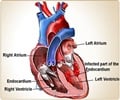Adding an extra four inches of fat around the waist can increase a person's risk of being hospitalised with heart failure, warn researchers.
Adding an extra four inches of fat around the waist can increase a person's risk of being hospitalised with heart failure, warn researchers.
A study led by investigators at Beth Israel Deaconess Medical Center (BIDMC) has found that larger waist circumference is associated with increased risk of heart failure in middle-aged and older populations of men and women.The findings, published online in the April 7 Rapid Access Report of the journal Circulation: Heart Failure, showed that increased waist size was a predictor of heart failure even when measurements of body mass index (BMI) fell within the normal range.
A life-threatening condition that develops when the heart can no longer pump enough blood to meet the body's needs, heart failure (also known as congestive heart failure) is usually caused by existing cardiac conditions, including high blood pressure and coronary artery disease.
Heart failure is characterized by such symptoms as fatigue and weakness, difficulty walking, rapid or irregular heartbeat, and persistent cough or wheezing.
To reach the conclusion, researchers examined two Swedish population-based studies, the Swedish Mammography Cohort (made up of 36,873 women aged 48 to 83) and the Cohort of Swedish Men (43,487 men aged 45 to 79) who responded to questionnaires asking for information about their height, weight and waist circumference.
Over a seven-year period between January 1998 and December 2004 the researchers reported 382 first-time heart-failure events among the women (including 357 hospital admissions and 25 deaths) and 718 first-time heart-failure events among men (accounting for 679 hospital admissions and 39 deaths.)
Advertisement
"By any measure - BMI, waist circumference, waist to hip ratio or waist to height ratio -our findings showed that excess body weight was associated with higher rates of heart failure," explains Emily Levitan, ScD, the study's first author and a Research Fellow in the Cardiovascular Epidemiology Research Unit at BIDMC.
Advertisement
Furthermore, adds Levitan, among the men, each one-unit increase in BMI was associated with a four percent higher heart failure rate, no matter what the man's waist size. In women, she adds, BMI was only associated with increased heart failure rates among the subjects with the largest waists. Finally, the authors found that the association between BMI and heart-failure events declined with age, suggesting that the younger the person, the greater the impact of weight to heart health.
"This study reinforces the importance of maintaining a healthy weight," says Levitan.
Source-ANI
THK














